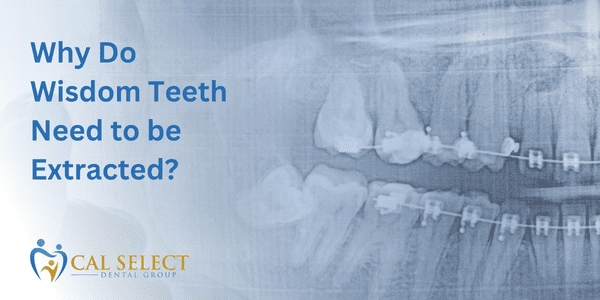
Also known as third molars, wisdom teeth typically emerge between the ages of 16 and 25, marking the final stage of dental development. Most teens and young adults have at least one third molar, and 75% of that group have four of them - one each on both the left and right sides of the upper and lower jaw.
Unfortunately, the human jaw has gotten progressively smaller over thousands of years. Most people have room for 28 teeth, but when those last four come in, the mouth becomes crowded, and complications ensue.
Impacted Wisdom Teeth, A Cause for Concern
When wisdom teeth fail to erupt correctly, they become impacted, meaning they are trapped within the jawbone or gums. This impaction can lead to a variety of painful and damaging consequences, including:
- Pressure on Nearby Teeth: When wisdom teeth erupt askew, they exert pressure on adjacent teeth, causing misalignment and overcrowding. This causes pain and potentially damages the roots of neighboring teeth.
- Pericoronitis: Inflammation of the gums surrounding a partially erupted wisdom tooth can cause pain, swelling, and lead to infection.
- Cysts and Tumors: In severe cases, impacted wisdom teeth can contribute to the formation of cysts or tumors in the jawbone.
- Sinus problems: A misaligned wisdom tooth can push against the sinuses, leading to stiffness and painful headaches.
- Hygiene problems: Those shrinking jaws also make it harder to reach your back teeth for brushing and flossing. Poor oral hygiene can lead to bad breath, tooth decay, and infections that can spread to the neck and throat.
When all of these risk factors are taken into consideration, it’s no wonder that many people opt for early removal of their wisdom teeth, before the third molars even begin to erupt.
The Benefits of Early Wisdom Tooth Removal
Minimized Pain and Discomfort: Removing wisdom teeth before they cause significant pain or discomfort reduces the need for stronger pain medication and ensures a more comfortable recovery. Current research indicates that people who get their wisdom teeth removed before the age of 21 have a significantly faster recovery time.
Prevents Future Complications: Proactive removal prevents potential complications like damage to neighboring teeth, bone loss, and the formation of cysts or tumors.
Simplified Procedure: The teeth are much easier to remove when the roots and bone haven’t fully formed yet. An easier procedure with a shorter surgery time can also lead to a quicker recovery.
Surgery Expectations
While a dentist may be able to extract an erupted wisdom tooth, the removal of third molars is most often a simple outpatient surgery. There are a few things to expect from this procedure.
- Time: Third molar extractions can take as little as one hour, or several hours, depending on the complexity and the number of teeth being removed.
- Pre-surgical instructions: Any surgery will involve a list of preparatory instructions. Make sure you follow these precisely to ensure a smooth procedure.
- Anesthesia: Depending upon the level of complexity of the extraction, and the preferences of the doctor and patient, the procedure will require either local anesthesia (the patient stays awake) or general anesthesia (patient asleep). If general anesthesia is used, you’ll need a friend or family member to drive you home.
- Post-op discomfort: A certain amount of discomfort is to be expected after any surgical procedure. After wisdom teeth are removed, you can expect bleeding, which should be easily addressed by applying pressure with a gauze pad. Swelling can be treated by placing an ice pack on the outside of your cheek. About 2-5% of patients also experience a condition called a “dry socket” that exposes nerves at the surgical site. Luckily, this can be quickly addressed by the dentist or oral surgeon.
Personal preference and consultation with your physician all factor into when you choose to have your wisdom teeth removed. And if your wisdom teeth either don’t erupt, or emerge without complications, the teeth still need to be monitored vigilantly so any developing issues are caught early.
The pros at Cal Dental are ready to give you an honest evaluation of whether and when your wisdom teeth need to be removed. Contact us now!
